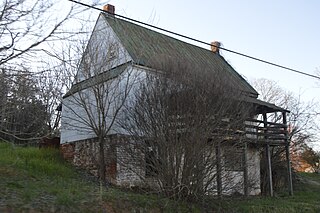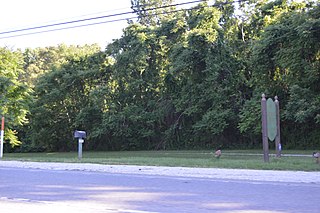
Amherst County is a county, located in the Piedmont region and near the center of the Commonwealth of Virginia in the United States. The county is part of the Lynchburg Metropolitan Statistical Area, and its county seat is also named Amherst.

State Route 151 is a primary state highway in the U.S. state of Virginia. The state highway runs 35.22 miles (56.68 km) from U.S. Route 29 at Buffalo Hill north to US 250 at Critzers Shop. SR 151 traverses the Blue Ridge foothills of western Nelson County, where the highway provides access to the Wintergreen Resort.
David Shepherd Garland was a U.S. Representative from Virginia.

Hanover County Courthouse is a historic courthouse located in the community of Hanover Courthouse, the county seat of Hanover County, Virginia. Built about 1735, it is one of the nation's oldest courthouses still in use for that purpose. It is historically notable as the site of the Parson's Cause case, which was argued by Patrick Henry in 1763. It was designated a National Historic Landmark in 1973. A modern courthouse complex stands nearby, which now houses most of the county's judicial functions.

The Reynolds Homestead, also known as Rock Spring Plantation, is a slave plantation turned historical site on Homestead Lane in Critz, Virginia. First developed in 1814 by slaveowner Abram Reynolds, it was the primary home of R. J. Reynolds (1850–1918), founder of the R. J. Reynolds Tobacco Company, and the first major marketer of the cigarette. Upon liberation of the plantation in 1863, 88 people were freed from captivity and enslavement. It was later designated a National Historic Landmark in 1977. The homestead is currently an outreach facility of Virginia Tech, serving as a regional cultural center. The house is open for tours.

Edgewood, also known as Higginbotham House, is a historic home located at 138 Garland Avenue in Amherst, Amherst County, Virginia. It was built in 1818, by Arthur B. Davies a local attorney and Amherst County Court Clerk. It is a two-story, seven-bay, T-plan brick dwelling in the Greek Revival style. It sits on an English basement and features a two-story pedimented wooden portico. Additions made in 1972 are in the Federal style. The house retains most of its original woodwork and mantels, and features murals painted by an unknown local artist. The building housed the Higginbotham Academy from 1851 to 1860, as well as the local Masonic Hall, and meeting place for a Methodist congregation.

Edgewood, also known as Massie House and Boulder Springs, is a historic home and farm located at 591 Puppy Creek Road near Amherst, Amherst County, Virginia. It was built by Joseph Hardin Massie between 1858 and 1869. It is a two-story, T-shaped plan, brick house, with a copper-clad gable roof in the Greek Revival style. The house was altered between 1900 and 1927. Also on the property are the contributing bank barn, a 19th-century corn crib, c. 1920 cattle corral, a 19th-century log house, a family cemetery and the ruins of outbuildings and secondary dwellings.

Brick House, also known as Garland House or King David's Palace, is a historic home located in the village of Clifford, Amherst County, Virginia. It is a two-story Federal Style, Flemish bond brick house with a projecting pavilion. It was built about 1803 by David Shepherd Garland, later a U.S. Congressman, and measures 65 feet by 44 feet. Two additions were made during the nineteenth century; the first, about 1830, behind the east parlor and the second, about 1850, was adjacent to the dining room and the first addition.

Clifford is an unincorporated community in Amherst County, Virginia, United States. Clifford is located on Virginia State Route 151 4.3 miles (6.9 km) north-northeast of Amherst. Clifford has a post office with ZIP code 24533, which opened on March 23, 1883. Five sites in the vicinity of Clifford are listed on the National Register of Historic Places: Brick House, Clifford-New Glasgow Historic District, Geddes, Mountain View Farm, and Winton.

Forest Hill is a historic home located near Amherst, Amherst County, Virginia. The original section was built about 1803, with two-story wings added later in the 19th century. It is a two-story, frame I-house with interior Federal style detailing. Also on the property are the contributing tobacco barn, smokehouse, tenant house, corncrib, crib barn, and tool shed.

The Glebe, also known as Minor Hall, is a historic Glebe House located near Amherst, Amherst County, Virginia. The original section, now the rear ell, was built about 1762, with the two-story, five-bay main block dated to about 1825. Other additions are the kitchen wing, added about 1919; two porches attached to the south and east elevations and added about 1937; and the laundry room wing, built in the second half of the 20th century. Also on the property are the contributing garage, tool shed, and site of a 20th-century barn. It was built by the Reverend Ichabod Camp, the only Anglican minister to serve Amherst Parish and the only Anglican minister to occupy The Glebe while it was owned by Amherst Parish between 1762 and 1780.

Tusculum was a historic home located near Amherst in Amherst County, Virginia, United States. It was a two-story Georgian and Federal style frame house built in two principal phases. The north section was built possibly as early as the 1750s, with the south section added about 1805. It sat on a brick and stone foundation and was covered in beaded weatherboard siding. The house was acquired by the Association for the Preservation of Virginia Antiquities in 2003. It was added to the National Register of Historic Places in 2004. The house has been described as "one of the oldest and most architecturally significant dwellings in the Virginia Piedmont", and is said by one source to have been the birthplace of Senator William H. Crawford.

Geddes is a historic home located near Clifford, Amherst County, Virginia. It was built in several stages between about 1762 and the mid-19th century. It is a 1+1⁄2-story, Colonial era frame house of post and beam construction with a hipped roof. It is referred to as the oldest house in Amherst County by area residents. Its builder, Hugh Rose, is best remembered as the friend of Thomas Jefferson who looked after Jefferson's family at Geddes during the British raid on Charlottesville in 1781.

Mountain View Farm, also known as Spencer Plantation and Mountain View Farm at Rebec Vineyards, is a historic home and farm located near Clifford, Amherst County, Virginia. The property includes an 18th-century mansion, built about 1777, a 19th-century cottage and five other supporting buildings. The main house is a standard timber frame, two-story, three-bay, I-house with a rear ell addition. It is sheathed in weatherboard with end chimneys. It was moved to its present site in 1831. The cottage is a one-room building with a lean-to shed addition. It was originally used as a doctor's office by Dr. Paul Carrington Cabell, and probably dates to the 1830s or 40s. Also on the property are the contributing well house, a playhouse, a smokehouse, an ice house, carriage house, and a chicken coop. The property has been home to Rebec Vineyards since 1987.

Oakley is a historic home and farm located near Upperville, Fauquier County, Virginia.

Pine Slash, also known as Prospect Hill, is a historic home located at Studley, Hanover County, Virginia. The main house was built about 1750, and is a one-story dwelling of colonial vertical plank construction with a metal gable roof. In addition to the main house, the property includes a contributing second residence and a brick outbuilding, both dating from the early 19th century. Pine Slash is also significant as American Founding Father Patrick Henry's home in the 1750s.

Rockbridge Inn is a home which served as a historic inn and tavern located near Natural Bridge, Rockbridge County, Virginia. It was built between 1821 and 1823, and is a two-story, five-bay, brick building. A two-story frame wing was built in 1841. It was remodeled in the 1880s, with the addition of two-story porches and interior redecoration. It operated as an inn until the 1940s. The property was owned in the 1880s by Colonel Henry Parsons, owner of Natural Bridge.

The Dulwich Manor, also known as Dulwich Farm, Dulwich House, and Amherst Academy, is a historic home located near Amherst, Amherst County, Virginia. It was built in 1909, and is a 2+1⁄2-story, five-bay, Classical Revival style brick dwelling. The façade is dominated by a large, two-story portico capped by a pediment formed by a cross gable roof with a small tripartite Palladian window in the tympanum. The house is covered by a steeply-pitched hipped roof of slate shingles. Also on the property is a contributing shed and gateposts.

Clifford–New Glasgow Historic District is a national historic district located at Clifford, Amherst County, Virginia. The district encompasses 43 contributing buildings, 6 contributing sites, and 6 contributing structures in the village of Clifford. The district includes a variety of residential, commercial, and institutional buildings built between about 1772 and 1961. Notable buildings include the St. Mark's Episcopal Church, the Saddlery (1814), and the Clifford Ruritan Building. Located in the district and separately listed are Brick House and Winton.

The Birthplace of Patrick Henry (1736–1799), the Founding Father and American statesman from Virginia, was a farmhouse called "Studley", located in what is now the village of Studley in Hanover County, Virginia. The house, a two-story brick structure, was built in the 1720s by John Symes, whose wife Sarah married Patrick Henry's father John after Symes died. Patrick Henry was born in the house on May 29, 1736. By 1796 the farmstead included a significant number of outbuildings. The house was destroyed by fire in 1807, and now only archaeological remnants remain.























